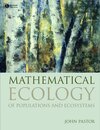
„Nevertheless, it is an excellent summary which will sweep away thecobwebs from the mind of someone who has learnt this stuff at sometime in the past. . . It would be ideal as a text for a coursetaught in a mathematics department, to convince mathematicsstudents that their skills in differential equations can be appliedto ecological problems.“ (Austral Ecology, 2011)
„Its best feature a the scientific soundness t hat permeates thewhole book, founded on a robust mathematical treatment of most ofthe arguments.“ (Ecoscience, June 2010)„Pastor (Univ. ofMinnesota, Duluth) does an admirable job of bridging the gap, providing a work that should quickly become a popular choice forupper-level undergraduate or graduate courses in both disciplines.“(CHOICE, January 2009)
Mathematical Ecology of Populations and Ecosystems
von John PastorPopulation ecologists study how births and deaths affect the dynamics of populations and communities, while ecosystem ecologists study how species control the flux of energy and materials through food webs and ecosystems. Although all these processes occur simultaneously in nature, the mathematical frameworks bridging the two disciplines have developed independently. Consequently, this independent development of theory has impeded the cross-fertilization of population and ecosystem ecology. Using recent developments from dynamical systems theory, this advanced undergraduate/graduate level textbook shows how to bridge the two disciplines seamlessly. The book shows how bifurcations between the solutions of models can help understand regime shifts in natural populations and ecosystems once thresholds in rates of births, deaths, consumption, competition, nutrient inputs, and decay are crossed.
Mathematical Ecology is essential reading for students of ecology who have had a first course in calculus and linear algebra or students in mathematics wishing to learn how dynamical systems theory can be applied to ecological problems.







